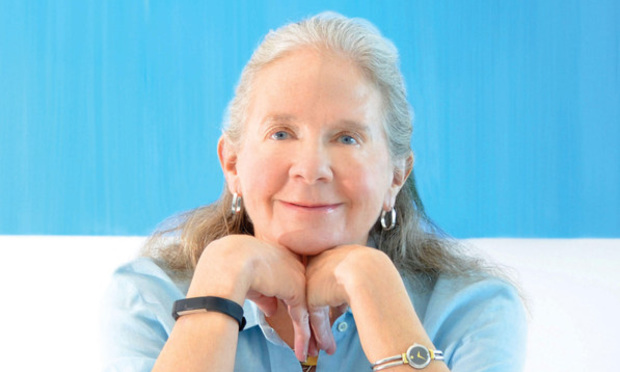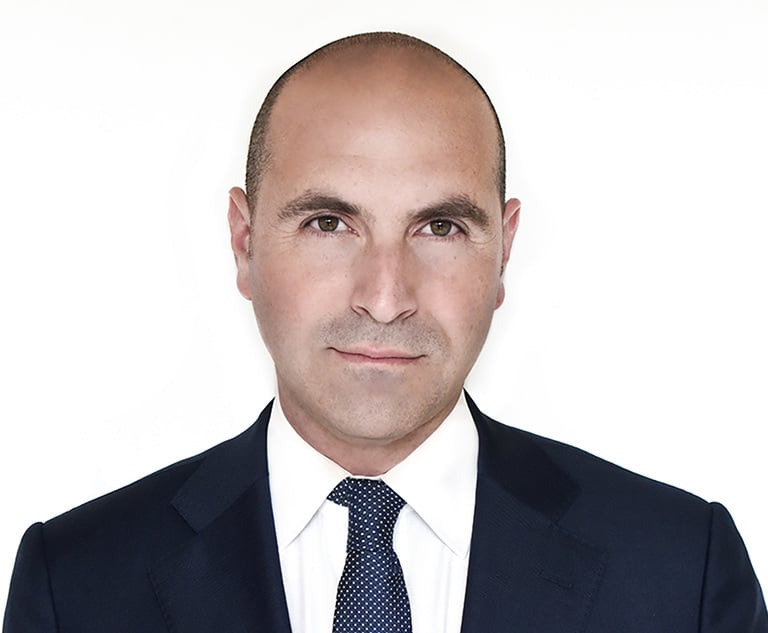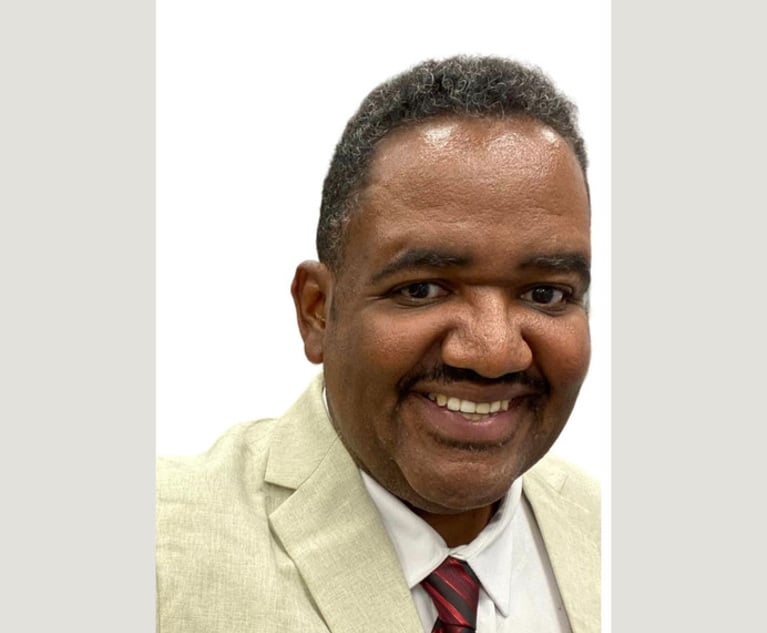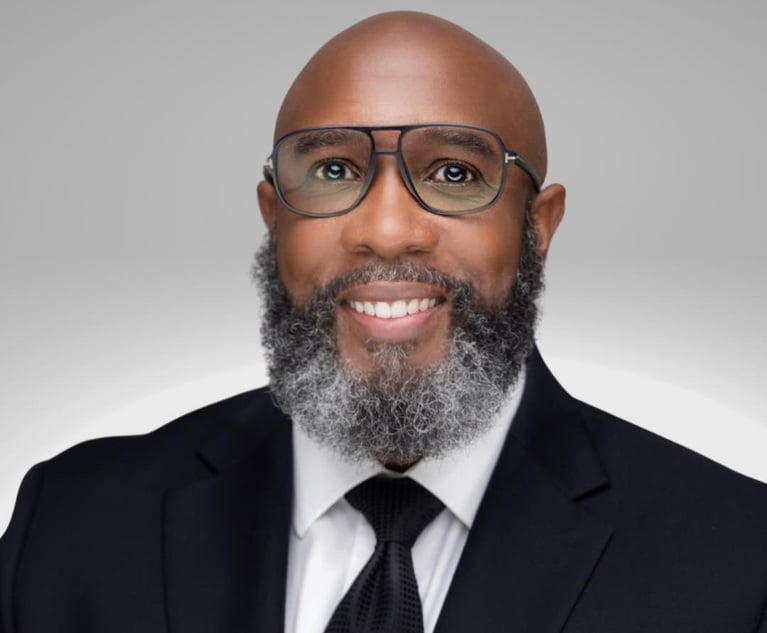Patricia White: Law Schools Should Make Law Graduates Better Humans, Not Just Better Lawyers
As she prepares to retire as dean of the University of Miami School of Law, White says she is proud of her role as a "change agent." But her biggest regret is that she could not solve education funding, which she sees as "the greatest problem facing higher education"
April 05, 2019 at 01:05 PM
5 minute read
 Patricia White, Dean of the University of Miami Law School
Patricia White, Dean of the University of Miami Law School
Patricia White thinks that 10 years is enough.
Her tenure as the first woman law dean at Arizona State University spanned a decade. And now, she's winding down her 10th year as dean at the University of Miami School of Law. She will step down in June.
More than 10 years, she said, and the draw of institutionalism grows too strong. Each year it becomes harder to be a “change agent,” a title that has always made her proud.
“I think that places benefit when they have new energy, the challenge of new energy,” she said. “The founding fathers were right — there should be term limits on presidents, I think. It's very easy to get complacent in a way. It's very easy to get tied into the problems in your institution because they're big jobs. It's easier to be more removed from what's going on in the world than you ideally should be.”
Change when she came to ASU and UM meant building a bridge between academia and the professional world. Before landing her first teaching job at Georgetown Law in 1978, White worked at Steptoe & Johnson, then Caplin & Drysdale. It was important for her to keep a foot in both realms.
In 1988, she began teaching at the University of Michigan while also working as of counsel at the Detroit firm Bodman Longley & Dahling. When she moved to the University of Utah in 1994, she was of counsel at Parsons Behle & Latimer.
For White, the job isn't so much about job placement rates as it is about providing a broad education and producing a well-balanced attorney. She believes a strong legal education means possessing intellectual breadth and the means to become an ideal member of a democratic society.
“It's the best civics education you could ever find. It makes you understand power structures, government structures, rights, liberties,” she said. “It ought to teach you the essential virtues of our democratic society: liberty, justice, due process, fundamental rights.”
When White took the job at UM in 2009, she was quick to assert this philosophy. Despite the fact that the country was reeling in financial turmoil, UM law was faced with a potentially back-breaking incoming class of 800 students — more than double the enrollment of a typical year.
In response, White wrote a letter imploring 1L students to re-consider why they applied to law school, recommending that they take a year off to work in public service in exchange for a $5,000 scholarship.
“Perhaps many of you are looking to law school as a safe harbor in which you can wait out the current economic storm,” she wrote. “If this describes your motivation for going to law school I urge you to think hard about your plans and to consider deferring enrollment.”
Despite those efforts, UM still saw a large 500-student class that year. White took the extra funds generated by the large class to set up a program called Legal Corps — matching UM law graduates who passed the Bar with nonprofit and public sector jobs.
Under the program, the university agreed to pay for the graduate's salary for six months, meaning the organization would have a free, licensed attorney during a recession normally characterized by layoffs and hiring freezes. White said the placement rate after the fellowship was 90 percent and is one of her proudest achievements.
Her emphasis on a well-rounded legal education also can be seen in her push for interdisciplinary hybrids between the law and medicine, law and communications, and even law and music; international offerings through LawsWithoutWalls and UM's international arbitration program; and expansion of hands-on clinics and externships.
And while she is proud of her tenure, her “biggest regret” is that she couldn't solve the problem of education funding.
“It's the greatest problem facing higher education. Period,” she said. ”People graduate with far too much debt. …The model of how to pay for education in this country is broken.”
According to a report from AccessLex Institute, the average tuition for a private law school was $46,240 in 2017, and $26,420 for residents at public law schools. On top of that, close to half of all law students still carry debt from their undergraduate degrees. Tuition at the University of Miami School of Law comes out to $54,134 per year, according to the school's website.
Experts say that this high debt funnels students into high-paying jobs at big law firms, contributing to a “brain drain” in the public sector. High tuition also acts as a barrier to students who would otherwise perform well in law school but don't have the means.
But White is not bowing out of the legal education arena completely. After a short sabbatical, she plans to return to UM to teach. She is already slated to teach two classes in the spring: one on trusts and estates, and one on torts.
She also is the chair of the American Bar Association Commission on the Future of Legal Education, whose mandate is “anticipating, articulating and influencing what will be dramatic changes in the legal profession in the next decade and beyond.”
Patricia White
Born: 1949
Spouse: James W. Nickel
Children: Olivia, Alex, Jennifer, Jonathan, Philip
Education: University of Michigan, J.D., M.A., 1974, B.A., 1971
Experience: Dean, University of Miami School of Law, 2009–present; Visiting Professor, Georgetown Law, 2009; Of counsel, Steptoe & Johnson, 2009; Dean, Arizona State University, 1999-2009; Professor, University of Utah SJ Quinney College of Law, 1994-1999; Of counsel, Parsons Behle & Latimer, 1994-1999; Professor, University of Michigan Law School, 1988-1994; Professor, Georgetown Law, 1978-1988.
This content has been archived. It is available through our partners, LexisNexis® and Bloomberg Law.
To view this content, please continue to their sites.
Not a Lexis Subscriber?
Subscribe Now
Not a Bloomberg Law Subscriber?
Subscribe Now
NOT FOR REPRINT
© 2025 ALM Global, LLC, All Rights Reserved. Request academic re-use from www.copyright.com. All other uses, submit a request to [email protected]. For more information visit Asset & Logo Licensing.
You Might Like
View All
Growing Referral Network, Alternative Fees Have This Ex-Big Law’s Atty’s Bankruptcy Practice Soaring
5 minute read
Against the Odds: Voters Elect Woody Clermont to the Broward Judicial Bench
4 minute read
Miami Civil Judge Myriam Lehr to Say Goodbye to the County Court Bench
4 minute readTrending Stories
- 1'It's Not Going to Be Pretty': PayPal, Capital One Face Novel Class Actions Over 'Poaching' Commissions Owed Influencers
- 211th Circuit Rejects Trump's Emergency Request as DOJ Prepares to Release Special Counsel's Final Report
- 3Supreme Court Takes Up Challenge to ACA Task Force
- 4'Tragedy of Unspeakable Proportions:' Could Edison, DWP, Face Lawsuits Over LA Wildfires?
- 5Meta Pulls Plug on DEI Programs
Who Got The Work
Michael G. Bongiorno, Andrew Scott Dulberg and Elizabeth E. Driscoll from Wilmer Cutler Pickering Hale and Dorr have stepped in to represent Symbotic Inc., an A.I.-enabled technology platform that focuses on increasing supply chain efficiency, and other defendants in a pending shareholder derivative lawsuit. The case, filed Oct. 2 in Massachusetts District Court by the Brown Law Firm on behalf of Stephen Austen, accuses certain officers and directors of misleading investors in regard to Symbotic's potential for margin growth by failing to disclose that the company was not equipped to timely deploy its systems or manage expenses through project delays. The case, assigned to U.S. District Judge Nathaniel M. Gorton, is 1:24-cv-12522, Austen v. Cohen et al.
Who Got The Work
Edmund Polubinski and Marie Killmond of Davis Polk & Wardwell have entered appearances for data platform software development company MongoDB and other defendants in a pending shareholder derivative lawsuit. The action, filed Oct. 7 in New York Southern District Court by the Brown Law Firm, accuses the company's directors and/or officers of falsely expressing confidence in the company’s restructuring of its sales incentive plan and downplaying the severity of decreases in its upfront commitments. The case is 1:24-cv-07594, Roy v. Ittycheria et al.
Who Got The Work
Amy O. Bruchs and Kurt F. Ellison of Michael Best & Friedrich have entered appearances for Epic Systems Corp. in a pending employment discrimination lawsuit. The suit was filed Sept. 7 in Wisconsin Western District Court by Levine Eisberner LLC and Siri & Glimstad on behalf of a project manager who claims that he was wrongfully terminated after applying for a religious exemption to the defendant's COVID-19 vaccine mandate. The case, assigned to U.S. Magistrate Judge Anita Marie Boor, is 3:24-cv-00630, Secker, Nathan v. Epic Systems Corporation.
Who Got The Work
David X. Sullivan, Thomas J. Finn and Gregory A. Hall from McCarter & English have entered appearances for Sunrun Installation Services in a pending civil rights lawsuit. The complaint was filed Sept. 4 in Connecticut District Court by attorney Robert M. Berke on behalf of former employee George Edward Steins, who was arrested and charged with employing an unregistered home improvement salesperson. The complaint alleges that had Sunrun informed the Connecticut Department of Consumer Protection that the plaintiff's employment had ended in 2017 and that he no longer held Sunrun's home improvement contractor license, he would not have been hit with charges, which were dismissed in May 2024. The case, assigned to U.S. District Judge Jeffrey A. Meyer, is 3:24-cv-01423, Steins v. Sunrun, Inc. et al.
Who Got The Work
Greenberg Traurig shareholder Joshua L. Raskin has entered an appearance for boohoo.com UK Ltd. in a pending patent infringement lawsuit. The suit, filed Sept. 3 in Texas Eastern District Court by Rozier Hardt McDonough on behalf of Alto Dynamics, asserts five patents related to an online shopping platform. The case, assigned to U.S. District Judge Rodney Gilstrap, is 2:24-cv-00719, Alto Dynamics, LLC v. boohoo.com UK Limited.
Featured Firms
Law Offices of Gary Martin Hays & Associates, P.C.
(470) 294-1674
Law Offices of Mark E. Salomone
(857) 444-6468
Smith & Hassler
(713) 739-1250







